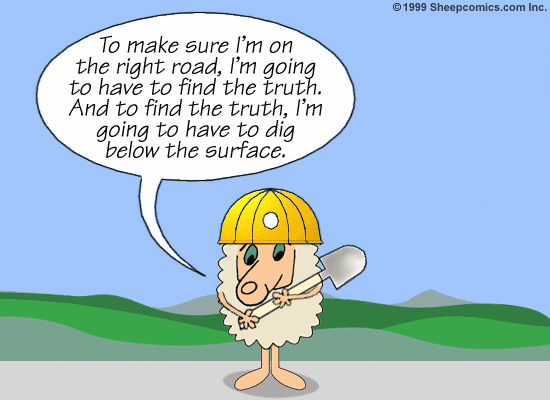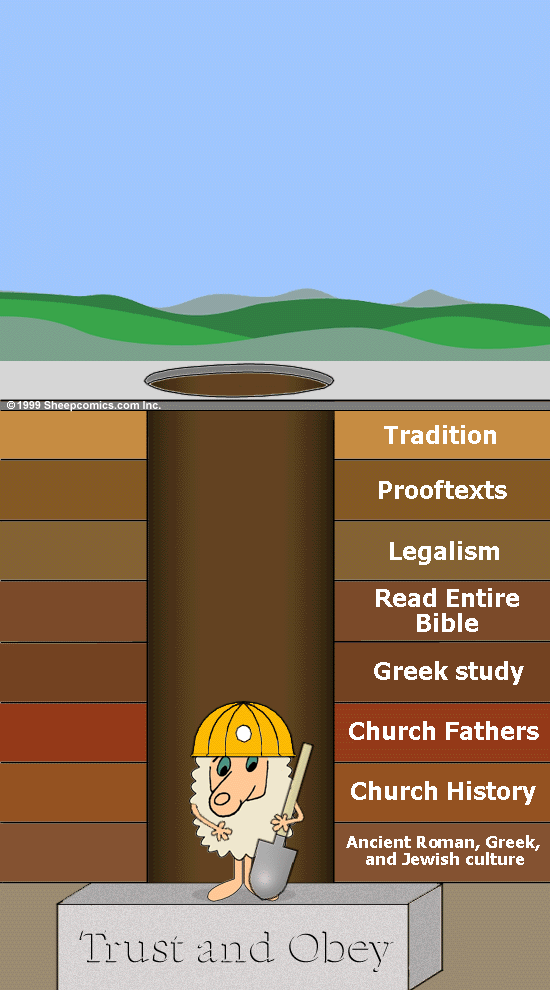









Editorial Notes
I have been taught that if we all open the Bible with our hearts sincerely desiring to find the truth, then we will all see what the Bible clearly says and we will all agree on everything. Then we will all experience a phenomenon that has eluded Christians for centuries: unity.
Years of experience in being taught from the Bible and in teaching from the Bible have taught me that it may not be quite that simple. Assuming that we all have Bibles and that we can all read (there were times in the past when neither could be taken for granted), we then have to deal with the fact that we all have different reading, comprehension, and analytical abilities. Not only that, but we have different personality types. Just to make things even more complicated, we who read English have several dozen or so different translations and paraphrases of the Bible to choose from.
That said, how then do we go about finding out what the "truth" is once we have a Bible in our possession and we have learned to read? Below is a list of different methods one may use to determine what the Bible says. You may be familiar with one or more of them. Most of these methods can be used in combination with others. The exception is method number one; it only works if you donít combine it with any of the other methods.
1. Leave it to an authority figure to tell you what is in the Bible and what to do about it. Keep your personal copy of the Bible in mint condition. Even if your Bible is many years old, it can retain that "new Bible smell" if you never open it. You may or may not go to heaven, but future generations will be bidding for your perfectly preserved turn-of-the-21st century bible on their equivalent of "Ebay".
2. Learn just the prooftexts (scripture fragments out of context) you need to prove that your brand of Christianity is the one that is always right about everything all of the time.
3. Read the Bible just to find the rules. Then enjoy making up your own rules so that you wonít even get close to breaking the rules you found in the Bible.
4. Read the entire Bible. This is one of my favorites. It takes an investment of time, but is well worth it. A great way to accomplish this is to listen to the Bible on tape while you are commuting. I did this earlier this year.
5. Deal with the fact that the Bible was not originally written in English. The Old Testament was written in Hebrew and the New Testament was written in Greek. I have learned much by looking up the Greek equivalents of some of the English words in the Bible.
6. Read the writings of the Early Church Fathers. One of the best "commentaries" on the first century church and its writings (the New Testament) is the writings of the second and third century church.
7. Study church history in general. See how things have changed. See where your denomination came from.
8. Learn about first century Greek, Roman, and Jewish culture. The legalist (see method three) doesnít like to admit it, but "history" and "culture" happen. For example, learning a little about what "normal" life was like for people in the first century helps us understand Paulís letters. They were written to people trying to follow Jesus in a first century Greek/Roman urban environment. The controversy occurs when we try to determine how much of the "letter" of Paulís letters we apply today versus how we apply the "spirit" of Paulís letters.
It would be great if Christianity was just about learning stuff. Great for me, anyway. I like to learn stuff. But it isnít just about leaning. Itís also about doing. This is where things get difficult. What Jesus wants us to do is disturbingly easy to understand. After all the studying is done, we still have to decide whether or not we are going to do what Jesus said to do.
Once, just out of curiosity, I went through all the recorded words of Jesus in the Gospels just looking for positive "do" commands. Not the "donít" commands, just the "do" commands. I was amazed at how short the list turned out to be. Here it is. I paraphrased it for myself and I donít claim it to be comprehensive.
- Be gentle, hunger for righteousness, be merciful, pure in heart, and a peacemaker.
- Love your enemies, and pray for them.
- Give to the poor and donít worry about the money.
- Pray to God in "secret", according to Godís will. Forgive others while you pray, and believe that what you are praying for can happen.
- Confess Jesus before others.
- "Desire compassion, not sacrifice"
- Forgive "seventy times seven".
- Love the Lord your God with all your heart, and with all your soul, and with all your strength, and with all your mind; and your neighbor as yourself.
- Commit to the above daily.
- Do "this" in remembrance of Me. (We now call "this" the Eucharist, or the Lordís Supper)
- Replicate the above among your fellow humans. This is done by baptizing them in the name of the Father and the Son and the Holy Spirit and teaching them to obey Jesus.
Beneath all the layers of tradition, rules, liturgies, church systems, bible translations and interpretations are some stark and simple commands from a God who wants us to trust Him. We choose whether to obey them or ignore them, and we will receive the reward or suffer the consequences for our decisions. Sometimes I wish it wasnít that simple.